
A RELAXED BODY

TAKE CARE OF YOUR BODY
When we feel overwhelmed we tend to eat poorly, sleep less, stop exercising and generally push ourselves harder. This can overtax the immune system, causing us to fall ill more easily.
If you take good care of yourself to begin with – by eating regular meals, including plenty of fresh fruit and vegetables, wholegrains and lean sources of protein such as nuts and pulses, keeping active, getting regular rest and doing things you enjoy – you’ll be better prepared to manage stress in the long run.

One cannot think well, love well, sleep well, if one has not dined well.
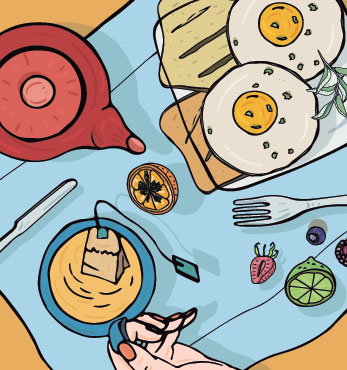
EXERCISE REGULARLY
Whether it’s a jog around the park or a pumping spin class, any kind of regular workout that elevates your heart rate and gets your body moving is a great way of relieving stress and tension. It causes the body to release endorphins, the mood-elevating hormones, and reduces levels of stress hormones such as adrenaline and cortisol. Exercise is also a way of taking time out for yourself, as well as building confidence and self-esteem.
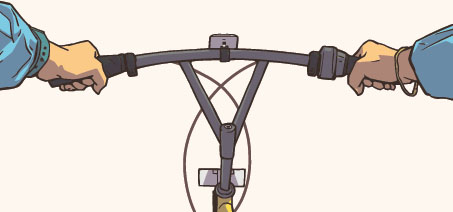
LET
EXERCISE
BE YOUR
STRESS
RELIEF
EAT SLOWLY
Wolfing down your food without really tasting it or taking the time to chew each mouthful properly plays havoc with your digestive system and can lead to overeating. As you eat your meal, focus all your attention on the smell, taste and texture of the food you are eating. Putting down your fork between mouthfuls allows you time to appreciate the food you are eating and consider whether you are still hungry or if you are just clearing your plate for the sake of it. Eating mindfully means that you are more likely to finish a meal feeling relaxed and satisfied.

TO LIVE
well
IS TO EAT
well
DON’T LET YOURSELF GO HUNGRY
Our brain depends on simple sugars such as glucose to function properly. If blood sugar levels drop significantly, it means we are unable to perform even simple tasks well. In extreme scenarios, we might even feel dizzy or anxious and our mood tends to sour. How well we regulate our blood glucose levels varies from person to person, but we all have the capacity to become flustered, angry and unable to function when we’re hungry. Eating regularly keeps your blood sugar levels stable and that will keep you feeling relaxed. Keep a stash of healthy snacks, such as oatcakes, carrot sticks or nuts, in your desk drawer or in your bag when you’re out and about so you don’t get caught out.
VISIT A SAUNA
The dry heat of a sauna is a great way of alleviating muscle tension as well as allowing the mind to take a break and quiet down. Studies have also suggested that saunas help trigger anti-inflammatory responses in the body that may help provide some relief if you suffer from asthma, chronic bronchitis or rheumatoid arthritis. So next time you visit the gym or spa, treat yourself to a sauna, steam room or Jacuzzi session and see if it leaves you feeling reinvigorated.
BLOW UP A BALLOON
It might feel a bit silly at first, but when extreme stress hits, inflating a balloon could be a clever way of tricking your body into breathing deeply. Your body needs oxygen to relax, and when you’re under pressure you’re likely to take shorter, shallower breaths. Blowing up a balloon forces you to breathe more slowly and deeply since you’re using your diaphragm. It also activates your parasympathetic nervous system, reducing your heart rate and relaxing your muscles. Keep a few balloons handy in case of emergencies!

LET YOUR
WORRIES
FLOAT
AWAY
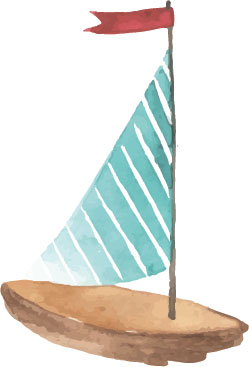
CHOOSE A SMARTER EVENING SNACK
Eating foods that are high in potassium and magnesium help to relax the muscles, and are particularly helpful if you suffer from twitchy, restless legs at bedtime. Good sources of magnesium include wholegrains, nuts and dark-green leafy vegetables. Potassium-rich foods include bananas, potatoes, apricots and milk. Oats make another great evening snack. A small bowl of porridge provides slow-releasing carbohydrates, which help keep your blood sugar levels stable overnight and calm frazzled nerves.
KNIT ONE,
PURL ONE
When you pick up a pair of knitting needles and cast on, you are, without even realising it, taking part in a form of meditation. Research has shown that listening to the quiet click of the needles along with the rhythmic and repetitive action of making the stitches induces the ‘relaxation response’ in a similar way to that of yoga or progressive muscle relaxation (see p.144).
On top of that, knitting can lower the heart rate by an average of 11 beats per minute, as well as reducing blood pressure and muscle tension.
All that is harmony for you, my Universe, is in harmony with me as well.
TENSE AND RELAX
Progressive muscle relaxation (PMR) is a relaxation technique that involves sequentially tensing and relaxing different muscle groups, starting with your toes and working your way up your body. Hold the tension for 5 seconds and then slowly relax your muscles. Researchers think this technique may help boost awareness of the physical sensations associated with relaxation, training your body so it knows how to relax the muscles more easily in future.
Find meaning in every moment
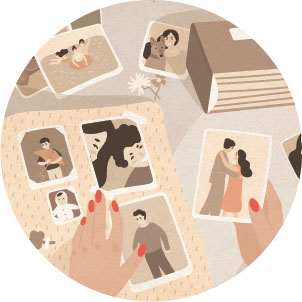
TRY A SELF-MASSAGE
A good massage can not only help you relax but also help alleviate anxiety, headaches, sleep issues and sore, tight muscles. If you can’t book into a spa for a treatment, you can give yourself a very effective self-massage. Abhyanga is an Ayurvedic practice that can be highly relaxing.
To try it yourself, heat some massage oil in the microwave or on the stove until it’s warm but still comfortable to touch. Massage your body with the oil, moving from the head to the feet. Begin with the outer folds of your ears, then massage your head and neck and work downwards. Use gentle circular motions on the joints and over the heart and abdomen. Massage straight up and down on the arms and legs. Finally, thoroughly massage your feet. Lie down and relax for at least 10 minutes, allowing the oil to penetrate your skin. When you are finished, remove the oil using a gentle cleanser.
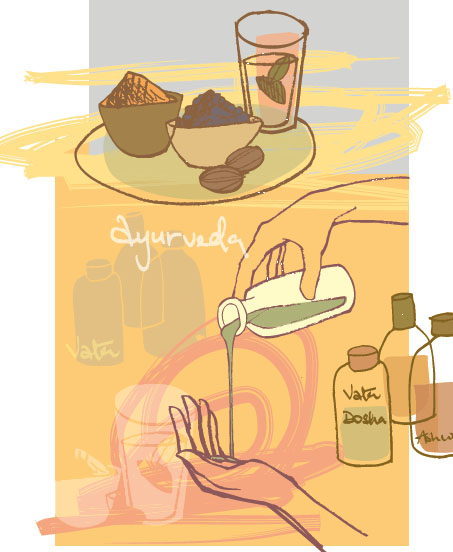
ADD A PINCH OF NUTMEG
Nutmeg has been used in folk medicine for centuries to relieve anxiety and for its sleep-inducing properties. A little goes a long way, so don’t overdo it. Add a pinch of nutmeg to a glass of warm milk or sprinkle a little onto some slices of banana before you go to bed. Add some cardamom for added benefits.
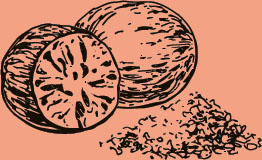
HAVE A GOOD CRY
When it all gets to be too much, go ahead and let the tears fall. Studies have shown that having a good weep helps release pent-up emotions. You might be surprised by just how cathartic it is to allow yourself to let go of tension you’ve been bottling up all day. You may feel emotionally fragile and drained for a while afterwards, so be kind to yourself. Splash some cold water on your face to soothe blotchy skin and make yourself a warm, comforting drink.
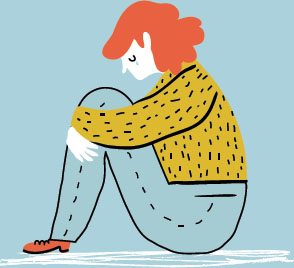
There can be no peace without, but through peace within.

TAKE A DIP
A regular evening swim might keep you fit but it’s the rhythmic strokes and the sound of the lapping water that make swimming so much more relaxing than other types of exercise. It produces the same relaxation response as yoga. All you have to focus on is your strokes and breathing, dissolving those negative thoughts.
HUG A HOT-WATER BOTTLE
The humble hot-water bottle has been used for generations to aid relaxation and relieve aches and pains – and with good reason. If your hands and feet are cold in bed you are more likely to suffer from restlessness and insomnia. Sleep researchers have found that putting a hot-water bottle at your feet switches on the body’s sleep mechanism, and it can also ease stress and tension in the body. Try lying on your back with a hot-water bottle under your neck to relax aching shoulder and neck muscles, or on your stomach to soothe and comfort you as you drift off to sleep. Just remember not to use boiling water and to check the seal before you get into bed with it!
GET CHEWING
If you know you’re heading into a stressful situation, try chewing a piece of gum. Studies have found that chewing gum can help lower cortisol levels and help you relax. It can also keep you from snacking in between meals and overeating, which is a negative side effect of stress – win-win!

Relax
REFRESH
RECHARGE
TAKE A NAP
Research has shown that a short daily siesta can not only improve your mood and give you an energy boost for the afternoon, but it can even reduce the risk of heart attack. If curling up in your office isn’t an option, go somewhere quiet on your break, such as a church or a park bench, and close your eyes for just a few minutes to reap the same benefits.
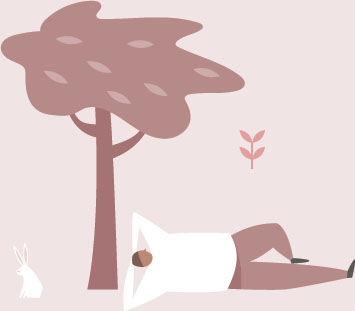
WHEN IT’S TIME TO SEE YOUR GP
If you are still struggling to relax despite trying some of the strategies in this book, and feel that stress is having a negative effect on your day-to-day life, it may be worth seeing your doctor.
Although self-help measures and complementary therapies can be helpful tools for coping with everyday pressures, some situations require medical advice.
Asking for help is nothing to be ashamed of: remember your doctor is there to help, not to judge you. Your GP may recommend a talking therapy such as CBT (cognitive behavioural therapy) or medication. Try to be honest with your doctor and give as much detail as possible about how you are feeling and what you’ve already tried. That way, they will have all the information they need to give you the best possible advice and treatment.
